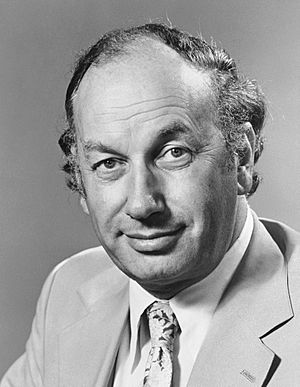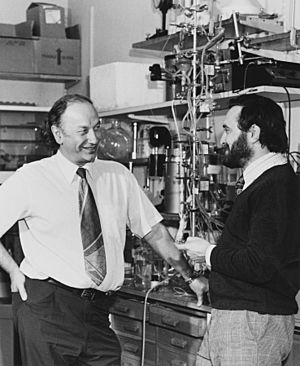John Vane facts for kids
Quick facts for kids
Sir John Vane
|
|
|---|---|
 |
|
| Born |
John Robert Vane
29 March 1927 Tardebigge, Worcestershire, England
|
| Died | 19 November 2004 (aged 77) Kent, England
|
| Citizenship | United Kingdom |
| Alma mater |
|
| Known for |
|
| Spouse(s) |
Elizabeth Daphne Page
(m. 1948) |
| Awards |
|
| Scientific career | |
| Fields | Pharmacology |
| Institutions | |
| Thesis | Blood flow and its relation to secretion in the stomach and smaller intestine (1952) |
| Doctoral advisor | Geoffrey S. Dawes |
Sir John Robert Vane (born March 29, 1927 – died November 19, 2004) was a British pharmacologist. A pharmacologist is a scientist who studies how medicines work in the body. Sir John Vane helped us understand how aspirin stops pain and swelling. His research also led to new medicines for heart and blood vessel problems. He won the Nobel Prize in Physiology or Medicine in 1982. He shared the prize with Sune Bergström and Bengt Samuelsson. They were honored for their discoveries about prostaglandins. These are important substances that affect many body functions.
Contents
Early Life and School
John Vane was born in Tardebigge, Worcestershire, England. He grew up in Birmingham with his two siblings. His father, Maurice Vane, came from Russian Jewish immigrants. His mother, Frances Vane, was from a farming family.
John went to a local state school from age five. Later, he attended King Edward's School in Birmingham. He became interested in chemistry early on. This led him to study chemistry at the University of Birmingham in 1944.
During his university studies, John found chemistry less exciting. But he still loved doing experiments. His chemistry professor, Maurice Stacey, suggested he study pharmacology. John was excited to try this new field. He moved to University of Oxford in 1946. There, he worked with Professor Harold Burn. John found his passion for pharmacology under Burn's guidance. He said Burn's lab became a top place for pharmacology research. It also trained many young pharmacologists. John earned his Bachelor of Science degree in pharmacology. He then worked briefly at the University of Sheffield. After that, he returned to Oxford. He completed his Doctor of Philosophy degree in 1953. His supervisor was Geoffrey S. Dawes.
Career and Research Discoveries
After finishing his PhD, John Vane worked in the United States. He was a professor at Yale University. In 1955, he moved back to the United Kingdom. He became a senior teacher and researcher at the University of London.
Work at the University of London

John Vane worked at the University of London for 18 years. He became a top professor in experimental pharmacology in 1966. While there, he created special ways to test how medicines affect the body. His research focused on how aspirin works. He also studied a substance called angiotensin-converting enzyme.
His most famous work involved aspirin and prostaglandins. Prostaglandins are natural chemicals in the body. They cause pain, fever, and swelling. Aspirin works by blocking the production of these prostaglandins. This discovery earned him the Nobel Prize in Physiology or Medicine in 1982. He published this important finding with Priscilla Piper.
Wellcome Foundation Research
In 1973, John Vane left his university job. He became the Director of Research at the Wellcome Foundation. He brought many of his colleagues with him. They formed the Prostaglandin Research department. This group, led by Salvador Moncada, continued important research. Their work led to the discovery of prostacyclin. Prostacyclin helps keep blood vessels wide and prevents blood clots.
Return to University Life
In 1985, John Vane went back to working at universities. He started the William Harvey Research Institute. This institute is part of Barts and The London School of Medicine and Dentistry. At this institute, Vane's team studied specific inhibitors of COX-2. They also looked at how nitric oxide and endothelin control blood vessel function.
Awards and Special Recognitions
John Vane received many honors for his work. He became a Fellow of the Royal Society (FRS) in 1974. This is a very high honor for scientists in the UK. He also received honorary doctorate degrees from several universities. These included Jagiellonian University Medical College and Paris Descartes University.
In 1977, he won the Lasker Award for discovering prostacyclin. In 1984, he was knighted, becoming "Sir John Vane." This was for his great contributions to science. In 2000, he received the Golden Plate Award. This award is from the American Academy of Achievement.
Personal Life
John Vane married Elizabeth Daphne Page in 1948. They had two daughters together. Sir John Vane passed away on November 19, 2004. He died in Princess Royal University Hospital, Kent. His death was due to long-term problems from leg and hip fractures. These injuries happened in May of that year. Lady Vane, his wife, passed away in 2021.
See also
 In Spanish: John Robert Vane para niños
In Spanish: John Robert Vane para niños
- List of Jewish Nobel laureates
 | Madam C. J. Walker |
 | Janet Emerson Bashen |
 | Annie Turnbo Malone |
 | Maggie L. Walker |

